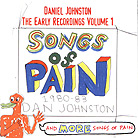June 2003
The recordings, which Johnston made in the basement of his parents’ house from 1980 to 1983, are of poor quality by conventional standards. If intended for a commercial distribution, one wonders if these songs should have been recorded on a machine that wasn’t discovered by the Leakeys three or four civilizations below the African desert. Yet their raw quality is one of the most striking features of these tracks. Their embarrassingly honest, often childlike lyrics and the rough, unpolished way Johnston sings them demand that we dig beneath their gravelly surface in case something of value is there. It definitely is. That is why I rate this set so much higher for enjoyment than for recording quality. In "More Dead Than Alive," about the singer’s obsession with a woman who does not love him, Johnston sets up a simple, moderate-tempo, two-chord boogie-woogie piano riff as the foundation. The song is mostly in the third person, but partly in the first person. Much else about it also illustrates the complexity of Johnston’s songs. "He played the game, but he failed the test / He remembers the wave of her hair and the shape of her breasts / He’ll tell the world about it now in a traveling show / Like some kind of circus, like some kind of circus / Like a monkey in a zoo." Then the refrain: "More dead than alive," drawing out "alive" in a playful melody that teams up with the piano riff to add discomforting humor to the song’s morose lyric. A verse beginning, "I pulled up a coffin and I stepped in," becomes a joke in which the singer describes a skipping record on the radio that keeps going, "I pulled up a coffin, I pulled up a coffin." Then, "I walked up to this psychological man / I said I got this problem about this coffin. / He said, Here’s some cough drops. / I said, Please don’t make such dumb jokes. / This is art, or is it art, or is it smart, or is it just my hea-a-a-art." After "More Dead Than Alive," we hear Johnston’s wispy speaking voice in childlike earnestness: "If you want me to -- I will." This turns out to be an introduction to The Beatles’ "I Will," in which Johnston sounds less like a crooning lover than he does a child learning to read and play a clunky piano line at the same time -- for instance, emphasizing the second syllable of "didn’t." In The Early Recordings’ many songs, Johnston playfully moves in and out of several selves: Johnston the artist; Johnston the unrequited lover; Johnston the observer of a desperate unrequited lover; Johnston the comedian laughing at himself as artist, unrequited lover, and observer. While Johnston gave us all his gift of song and is known to have earned the admiration of David Byrne, Kurt Cobain, the Butthole Surfers, and other prominent artists, he has experienced many years of serious mental and emotional problems that at times have required hospitalization. As listeners, we can enjoy Johnston’s art, paying whatever attention we may choose to the possibility that some of his playing with his own mind and personality may also involve playing with fire. GO BACK TO: |
 Daniel Johnston - The
Early Recordings Volume 1
Daniel Johnston - The
Early Recordings Volume 1 The two-CD Daniel Johnston set
The Early Recordings Volume 1: Songs of Pain and More Songs of Pain -- recorded
by one of popular music’s strangest yet most ingenious talents -- is easy to like and
dislike simultaneously. Or, if not dislike, feel uncomfortable about liking.
The two-CD Daniel Johnston set
The Early Recordings Volume 1: Songs of Pain and More Songs of Pain -- recorded
by one of popular music’s strangest yet most ingenious talents -- is easy to like and
dislike simultaneously. Or, if not dislike, feel uncomfortable about liking.